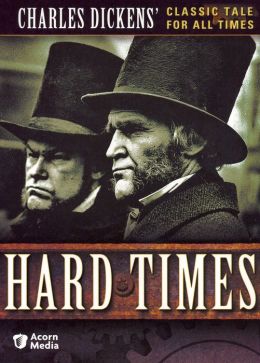
I just recently got to purchase and view the 1977 adaptation of Hard Times. I remember reading the original novel back in college. It was for a course in Victorian literature. As a rule, most college courses tended to avoid the longer works by authors, given the time allowed in a semester, and that rules out virtually all of Dickens. Hard Times, however is a realtively slim novel. It is basically a scalding comentary on the rise of industrialization at the time, in particular the small, industrial towns that were popping up in the north of England over the past few decades. The novel is to be beleived, these industrialized "progressive" villages were dominated by crushing uniformy, terrible working conditions, and mass exploitation of impoverished laborers. The story takes place in fictional Coketown, and centers around the ruthlessly materialistic schoolmaster Thomas Gradgrind, who discourages all flights of "fancy" in his pupils, and his friend, the blustering, "self-made man" Josiah Bounderby, who is later revealed to be a fraud. It is a satire on extreme ultalitarinism, which Gradgrind pounds into his students, and imposes upon his own children. Part of the tragedy of the tale is that Gradgrind, at least, seems to be well-meaning in this, and seems to realize his error after the damage has taken effect.
 Back when I first read this, I pictured Bounderby as looking like Mr. Bumble from Oliver Twist--in fact, like Timothy West's portrayl of the character in 1982. So it seems pretty appropriate here that he is actually played by Timothy West, And so he is. It's almost as though he's playing the same character. He's so gross and hypocritical, its quite a relief when he finally gets what's coming to him.
Back when I first read this, I pictured Bounderby as looking like Mr. Bumble from Oliver Twist--in fact, like Timothy West's portrayl of the character in 1982. So it seems pretty appropriate here that he is actually played by Timothy West, And so he is. It's almost as though he's playing the same character. He's so gross and hypocritical, its quite a relief when he finally gets what's coming to him.Also in this version, the city of Coketown is itself very well portrayed. With smoke stacks belching forth vile chemicals, it very much resmebles the city in the book. We didn't really see any of the city itself in the more recent adaptation by the BBC, as I recall, although I would recomend the DVD of that as well, in part becuase that version also includes a short film of Dickens' often anthologized ghost story "The Signal Man" as an added bonus. Bitzer, Gradgrind star pupil, is protrayed as a very pale albino boy in the 1977 version, unlike in the BBC version, but the same as in the novel. This is important, as Bitzer's paleness was a metaphor for the bland "colorless" school of thought Gradgrind imposed on his students.
No comments:
Post a Comment